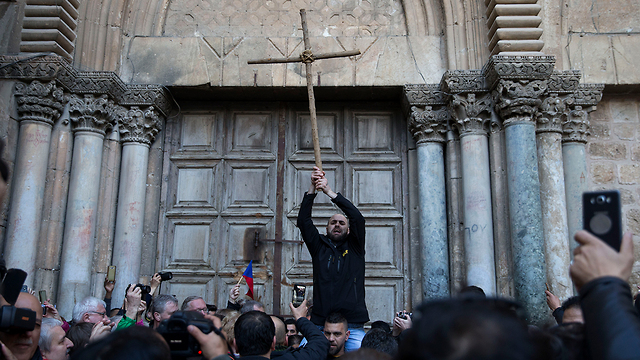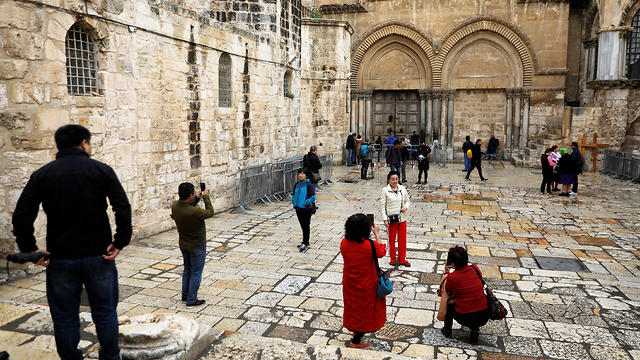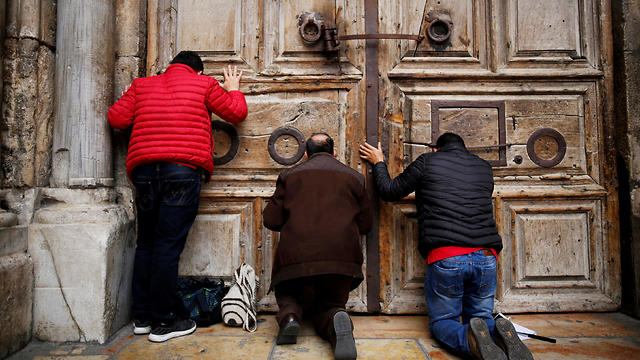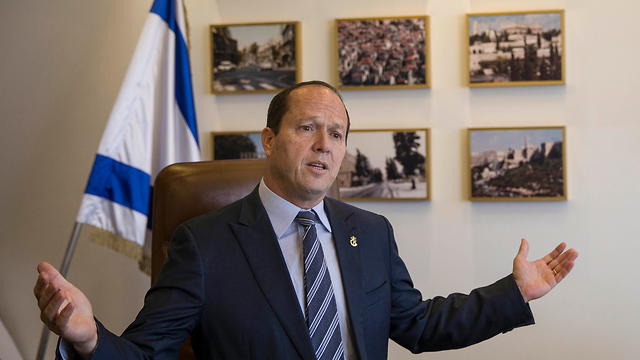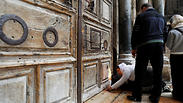
Yet another religious war averted in Jerusalem
After a three-day crisis that rocked the Christian world and led to the unprecedented closure of the Church of the Holy Sepulchre, church leaders offer a rare peek into their headquarters; ‘We have been here since the Byzantine era,’ they say. ‘The demand to pay municipal taxes now is inconceivable.’ Meanwhile, despite criticism from senior state officials, Mayor Nir Barkat stands to gain politically from the international scandal he created.
The 1,682-year-old impressive architectural structure was built at the site where Jesus—according to the Christian faith—was crucified, buried and resurrected. It’s one of the holiest places for Christians around the world, and it’s open all year long to visitors and worshippers.
It wasn’t shut down under caliphate rule or Ottoman rule, it wasn’t shut down during World War I or II, and it wasn’t shut down during the British Mandate. Even when the entire region is in chaos and everything around it goes up in flames, the Church of the Holy Sepulchre in Jerusalem’s Old City remains open.
But the shocked Romanian couple standing outside the closed doors had no way of guessing that exactly as they arrived here all the way from the town of Oradea on the Romania-Hungary border, the three churches co-managing the holy site would decide to close it over a property tax demand from the Jerusalem Municipality.
Florishel Aurelian had planned the trip as a surprise for her husband Sandor’s birthday. He’s a mechanical engineer, a devout Christian who visits the town’s church every Sunday. “I turned 47 years old today,” he cried. “And on Sunday, on our way to church, my wife told me she had bought us plane tickets to Jerusalem.”
“I wanted to make his dream come true,” Florishel said, caressing him. “We work so hard, and a friend found me a 400-euro deal for a flight and a two-night stay in a hotel for the two of us. I used our savings to pay for it. It’s a lot of money for us. On the other hand, it’s a life’s dream to come here and light candles in this holy place.
“We arrived yesterday afternoon, put our luggage in the hotel and came here right away, and they told us it was closed. We said we’d come today, but today it’s also closed. We won’t be here anymore tomorrow morning. We can’t believe this is happening. They told us it was because of municipality taxes, but that sounds like science fiction.”
We didn’t want to add to their grief, so we kept silent.
‘With spirit and blood, we’ll redeem the cross’
The Church of the Holy Sepulchre was closed for three days before Prime Minister Benjamin Netanyahu found the time to deal with the crisis and suspend the moves taken by the Jerusalem Municipality against the churches. It happened only after the foreign media offered live reports on the crisis, and the Jordanian king’s representative in the Islamic Waqf at the Temple Mount arrived to deliver a statement of solidarity with the Christian struggle.
A protest march held in the Christian Quarter on Tuesday afternoon ended at the plaza in front of the Church of the Holy Sepulchre, with a frantic crowd chanting, “With spirit and blood, we’ll redeem the cross.”
Whoever managed to forget how religiously explosive this city is, since last summer’s Temple Mount crisis, got another warning last week—this time in the Christian version.
The crisis that erupted gave us a rare peek into the largest churches in Israel, medieval traditions and buildings where time has stood still, despite their renovation. But beyond the fascinating figures we met, we sensed a great amount of frustration among the tourists, tour guides and Christian residents of the Old City.
On Wednesday, the church reopened, but during the three-day crisis we received a discouraging lesson in amateurish and irresponsible decision-making.
The state’s collision course with the two largest churches in the Holy Land, the Greek Orthodox and the Franciscan Catholic, first emerged in a bill initiated by Knesset Member Rachel Azaria of the Kulanu party. Azaria, a former deputy Jerusalem mayor, presented to the Ministerial Committee for Legislation with a proposed law to expropriate lands the churches had sold to private entrepreneurs.
In recent years, there have been several purchase deals by groups of Israeli businesspeople of lands owned by the Greek Orthodox Church in Jerusalem. These same lands had been leased out for years by the state and Keren Kayemet Le'Israel in long-term agreements, and there are some 1,400 families living on these lands. Their sale puts tens of thousands of residents of many neighborhoods in central Jerusalem—including Rehavia, Nayot and Talbiyeh—at risk of being evacuated. Some of them have already been required to pay a fortune to the new land owners to be permitted to stay in the homes they purchased for a full price.
Naturally, the churches opposed the law, saying it would strip them of their right to their assets.
The bomb which led to the holy site’s closure last week was dropped by the Jerusalem Municipality, with its unequivocal demand for property tax for church-owned buildings which do not serve as houses of worships. In addition to the churches themselves, which are exempt from these payments, the churches have hotels, cafés, stores and schools across the country whose income is used for the day-to-day operations of the church.
The municipality’s claim that there is no reason for local businesses not to pay property tax, even if they are owned by the church, isn’t unreasonable. But these properties have been in the city for centuries and have been run under many governments, and they have never been required to pay municipal taxes before.
This may be a logical move, but there was no attempt to hold a dialogue with the church leaders. The municipality’s drastic step, which included sending property tax bills worth around NIS 1 billion and—in some cases—orders of seizure of the church’s bank accounts, was seen by many as unwise and irresponsible.
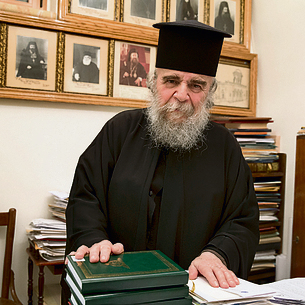
All this led the leaders of the three churches in charge of the Church of the Holy Sepulchre—the Greek Orthodox Church, the Custody of the Holy Land and the Armenian Patriarchate—to gather outside the church last Sunday and announce to the cameras their unprecedented decision to shut it down in protest of the "systematic campaign against the churches and the Christian community in the Holy Land in a flagrant violation of the existing status quo.”
The background of last week’s international and interreligious uproar is deeply rooted, of course, in internal political battles of ego in Israel: The Jerusalem Municipality’s move is part of Mayor Nir Barkat’s war against the Finance Ministry and Finance Minister Moshe Kahlon to increase the capital’s budget.
About two months ago, Barkat blocked the entrance to the Finance Ministry building with piles of garbage and placed signs all over the city reading, ‘Kahlon has given up Jerusalem.” That crisis ended with the appointment of a joint municipality and Finance Ministry committee, but in the meantime, Barkat has found another way to pressure the state by demanding property tax from the churches.
The mayor’s associates say Barkat informed Prime Minister Netanyahu of his intentions in advance, but the latter failed to do anything before the holy fire developed into a global storm.
Sold into slavery for two golden ducats
Every single activity in this ancient place is the result of a tradition several centuries old. Immediately after the declaration was made in front of the cameras, 69-year-old Wajeeh Nusseibeh was called to lock the doors. The key was handed to him by 53-year-old Adeeb Joudeh.
The two thick oak doors were designed to withstand a battering ram. There are several traditions and folktales concerning the opening of the church’s doors and the people responsible for it, and last Tuesday morning we got a live demonstration on the ground.
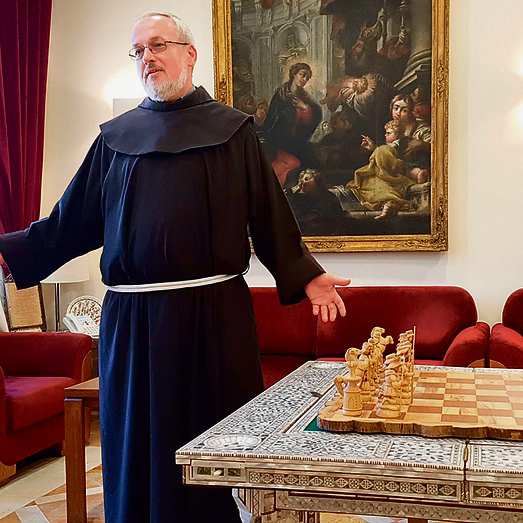
Nusseibeh says his family was put in charge of opening the church by the second caliph, Umar bin al-Khattab, who defeated the Byzantines in the year 638.
“It has been my family’s responsibility ever since. I have been doing this for 40 years now. I arrive at 4 am to open and return at 7 pm to close. In the summer, it closes at 9. I come in the morning, knock on the door, a monk hands me a ladder through the window, and I climb on it with the key and place it in the keyhole, which is high. In the evening I return, ask all the visitors to leave, and after I lock the door I return the ladder to the monk inside. He pulls it over to his side and shuts the window.”
“He’s distorting history,” says Joudeh, who is standing nearby, watching Nusseibeh give interviews to the foreign press and pose for photographs. “I’m the one responsible for the keys, and he works for me. He just opens and closes, like a doorman. The key is always in my possession.
“The Joudeh family is part of the al-Husseini family. Joudeh al-Husseini was the sheikh of Al-Aqsa, and we’re his family. We received the keys from Salah al-Din al-Ayubbi, who conquered Jerusalem from the Crusaders in 1187. Al-Ayubbi wanted to protect the Church of the Holy Sepulchre from any harm and gave the key to the strongest family in the city—to us. We’re the ones who brought the Nusseibeh family to work with us. At the time, the key was kept by sheikhs from the family, and it was beneath their honor to pull out the ladder and climb on it to open the doors, so they brought Nusseibeh. They have been doing this job for merely 500 or 600 years.”
“He can say whatever he wants,” Nusseibeh responds, “but the fact is that only I open or close the holy church. He can come here before me, but he has to wait for me. He can’t do anything on his own. Moreover, our family has the seal of the Holy Sepulchre, and I’m the one who seals the sepulchre before the fire comes out of it in the Holy Fire ceremony. It’s a great honor that has been bestowed on us.”
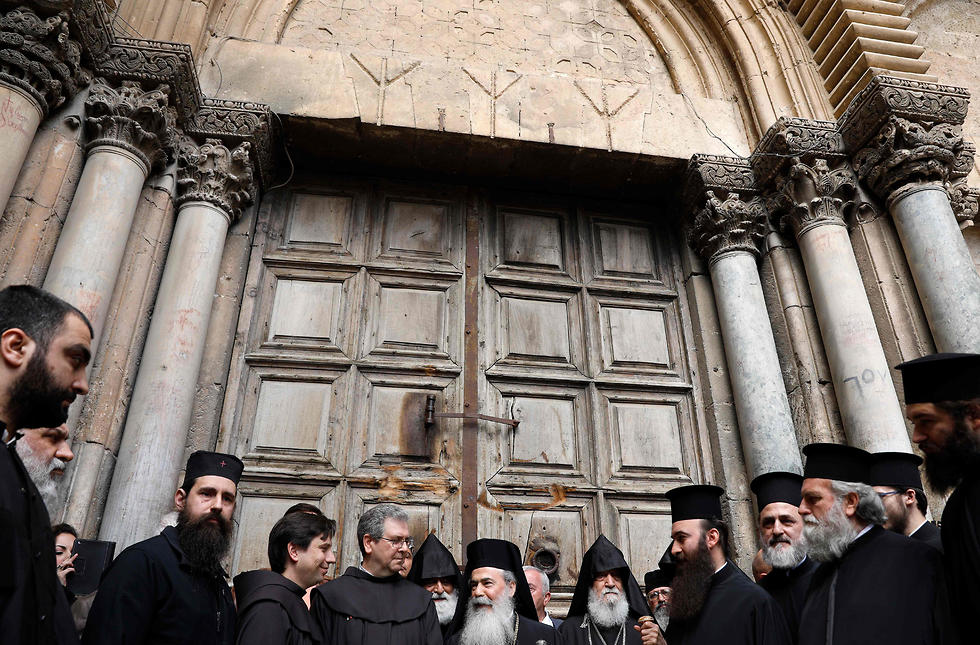
That day, groups of tourists just kept pouring in. From Italy, from Poland, from The Philippines, from Russia. They stood perplexed at the plaza in front of the church, their faces pale. Having no other choice, they prayed and sang hymns outside the church.
It’s the high season of pilgrimage, a month before Easter. Nearly half a million pilgrims arrive in Israel during this period. It’s the most profitable season for airlines and transportation companies, Jerusalem’s hotels and restaurants, the tour guides and souvenir sellers. A prolonged closure of the Church of the Holy Sepulchre would have resulted in mass cancellations.
Tens of thousands of people make a living from tourism here. There isn’t a single pilgrim who doesn’t buy candles before entering the church. They buy a few pictures of icons, figurines and oils and sanctify them in the church. These souvenirs are a priceless gift for relatives and friends at home.
The Attia family has three souvenir stores outside the church. The elderly father, Haj Yihye, sits on a chair as his two sons, Marwan and Safwan, bargain with tourists who stop by.
“It’s completely destroyed the business,” the father says. “There’s no point for them to buy souvenirs if they can’t sanctify them inside the church. We don’t understand what our mayor was thinking when he decided to demand property tax. Did he have to do it now? At the high season?”
On our way to the Custodia Terrae Sanctae, the Catholic Custody of the Holy Land, we entered the Kahvedjian family’s store, Elia Photo, on Al-Khanka Street.
The patriarch of the family, Elia, was born in the city of Urfa in southeast Turkey. A total of 163 members of his family were murdered by the Turks in their massacre of the Armenians in 1915. He was barely five years old at the time and was rescued by the skin of his teeth by a Kurdish merchant, who sold him into slavery for two golden ducats. After many hardships, he arrived in Israel with other orphaned Armenian children like him, first in Nazareth and then in the Armenian Quarter in the Old City of Jerusalem. Here, he took photography lessons at the Hanania brothers’ store on Jaffa Street, and opened his own store in the Old City in 1949.
The place is fascinating. Elia not only took pictures but also bought and collected old photographs from the 19th century, showing Jerusalem and other cities in Israel at the very beginning of their development. We spot a photo from the 1930s of one of the Nusseibehs standing on the ladder with a fez on his head, opening the church doors. And there’s another photo from 1930, of a girl filling a bowl with water coming out of a drinking fountain on a street in the Armenian Quarter. Above her head, there is a caption in ancient Arabic in looped handwriting.
“At the time, there was someone who was able to read out what it says there,” says Eli, the grandson of the store’s founder. “It says, ‘A ruler who will impose taxes on the Armenian Church is not only cursed, he’s a bastard and the father of a bastard and the grandfather of a bastard, etc.’ He and his son and his son’s son, the entire dynasty, will be cursed. And this was dictated by one of the Ottoman rulers to warn his successors against imposing taxes on the church. That’s the tradition here.”
A city within a city
Al-Khanka Street climbs up to Casa Nova Street, and after taking a right turn we reach St. Francis Street, where the Franciscan Order’s Custodia Terrae Sanctae is located. About six months ago, the Order marked the 800th anniversary of its founding.
The huge, impressive building dates back to the Crusader era and is the home of the custos, the Catholic Church superior, the Pope’s representative in the Holy Land.
The custodial vicar, Frater Dobromir Jasztal, who was born in Poland 52 years ago, led us to a room with a large table at its center, and on it a chessboard with wooden pieces carved by an artist.
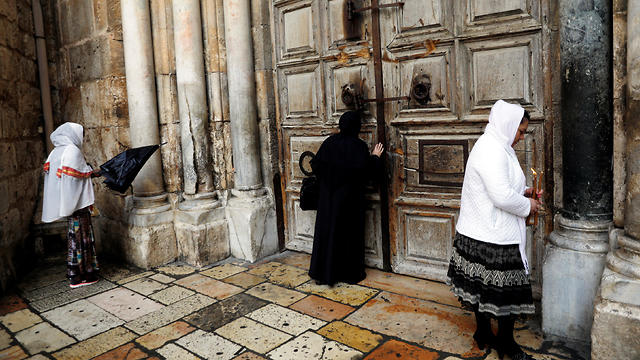
“Not long ago,” Frater Dobromir said with a smile, “we marked 800 years of our presence here, so we have quite a lot of experience with the authorities in the Holy Land. We have always had good relations with the governments here. The issue isn’t just about money. It has to do with the church’s activity, with its identity.
“The church’s assets are used for houses of worship, monasteries, education and community institutions. There is no money industry here. Our proceeds are returned to the community and used for living and maintenance needs. The Israeli government doesn’t support us financially, and we have made no such demand. But you have to understand that millions of people from around the world and Israel visit the church institutions, and we have maintenance and operation costs. Our custody is responsible for the Holy Land, Jordan, Syria, Egypt, Lebanon, Cyprus and Rhodes. We have 270 monks in all these countries, priests, workers serving in this entire domain. We have 15 schools across the Holy Land, where Christian, Muslim and Jewish children study. These are places which have always been recognized as part of the church, and there has been a status quo concerning them.
“The Jerusalem Municipality’s move was sudden. They didn’t discuss it with us. So the step we took against the violation of the status quo is very painful and unfortunate, both to our identity and to our service. We are working here in favor of all Christians in the world, and we had to take a significant step to make it clear that any harm to the church harms all Christians wherever they are. Closing the Church of the Holy Sepulchre was aimed at clarifying that the demand to pay municipal taxes is inconceivable.”
Do you think Israel’s decision-makers understand the meaning of this crisis?
“Yes, I think they understand now just how dramatic their move was.”
On our way to the Greek Orthodox Patriarchate, we crossed paths with a large protest march. Apart from “With spirit and blood we’ll redeem the cross,” they also chanted, “Oh Messiah, oh dear, we’ll defend you at all costs.”
One of the young protestors, sitting on his friend’s shoulders, held a cross made of two wooden boards tied to each other. The atmosphere was tense, people were fuming, and police watched over them from the side.
We were greeted by Archbishop Aristarchos of Constantina, the elder secretary-general of the Greek Orthodox Patriarchate in the Holy Land, the deputy of Patriarch Theophilos III of Jerusalem.
First of all, he gave us a tour of the place. Like the Custodia, it’s a huge compound closed to visitors. A city within a city, with allies, amazingly beautiful internal courtyards and aromatic flower gardens, built over the streets of the Old City we walk through. A magical, mysterious world run with religious formality according to ancient traditions.
He wears a kalymmavchi on his head, a black stiff cylindrical head covering worn during services, and an ankle-length black garment. His beard and his hair seem to have turned white long ago. He was born 71 years ago in a small village in Crete and arrived in the Holy Land as a novice monk in 1962. He experienced Jordanian rule, is long accustomed to Israeli rule, and is fluent in Hebrew.
While hosting us in his office with its arched ceiling, he was informed of Prime Minister Netanyahu's announcement that he was suspending all moves taken against the church.
“That’s good news,” he said as his assistant, a Romanian nun, poured black Greek coffee into tiny porcelain cups.
“We felt great grief. We took a harsh step in response to a harsh situation. We simply found ourselves with no other choice. The Church of the Holy Sepulchre, the church of the resurrection of Jesus the Messiah, is Christianity’s most sacred place. It wasn’t easy for us.
“The Jerusalem Municipality should have been more considerate towards us. Instead, it crossed a line here. You can’t exempt the church and collect taxes from an adjacent property which belongs to the church.
“The Church of the Holy Sepulchre and the rest of the churches in the Holy Land are places of reconciliation, of peace. They contribute to the state. These tourists, the pilgrims, are profitable for the state. All we want is to continue the situation as it was.
“The patriarchy dominates Israel, the West Bank and the Palestinian Authority, Jordan and Qatar. We have 10,000 believers in Qatar. In the Gaza Strip we have 2,000 believers. And the church tries to maintain good relations with the Israeli authorities. Sometimes, like now, there are problems, difficulties, but we’re not interested in bad relations.
“You have to understand, the status quo is very important to us. There is a status quo in the relations between the churches too. We have a joint committee of the three churches on status quo issues concerning the Church of the Holy Sepulchre.
“You can see from my office window the small ladder outside the window on the second floor of the holy church. It’s visible to anyone standing at the plaza in front of the church. This ladder is a legend. It has been there for decades. I can’t even remember what it’s about, although I’ve been here for almost 60 years. All I know is that it mustn’t be moved, so no one touches it. That’s the status quo.
“We have been here since the Byzantine era. Constantine the Great and his mother Helena built the Church of the Holy Sepulchre after conducting an examination and sending people to dig and research. It was built on the skull, where Jesus the Messiah was crucified and resurrected. They started building it in 325 till 336, 11 years of work. Other church institutions were built around it, and there has been humanitarian and educational activity taking place here since the Byzantines.
“So to ask for property tax now, retroactively, to seize bank accounts? And it’s important to stress that the protest of the Holy Land’s local churches isn’t against the Israeli public and the Jewish people. We have good relations with the Jews and we’re familiar with your history. We hope the Israeli people don’t experience crises and difficulties.”
‘A completely unnecessary crisis’
After three days of heavy pressure on the Foreign Ministry from the entire world, the prime minister finally announced that the measures would be frozen. At the same time, he ordered the appointment of a committee to discuss the property tax issue and the asset crisis.
As far as Barkat is concerned, this is a significant achievement: A committee that will put the emotionally charged issues on the table, after the churches have been trying to evade a discussion on property tax for years.
Barkat also stands to gain from the affair politically. In the next two weeks, he is expected to announce his decision not to seek reelection as Jerusalem mayor, as he plans to enter the race for a spot on Likud’s Knesset list. He is likely enjoying being in the limelight and proving that he can play in the “major league” with a direct influence on an international diplomatic crisis. The fact that Likud ministers avoided attacking Barkat over this move proves that he managed to take a walk on the wild side without paying a political price.
Senior state officials in Jerusalem, on the other hand, didn’t spare Barkat from harsh criticism. “The crisis was completely unnecessary,” one official said. “The Jerusalem Municipality took extremely brutal steps, without a dialogue, by surprise, in an offending manner: Seizing bank accounts, doing irrational things, without any coordination with the Israeli government, the Foreign Ministry and the Interior Ministry.
“If the municipality was so adamant about these measures, it should have created a dialogue with the churches. At some stage, we will reach a situation in which church institutions that yield profits will pay taxes—after we complete the negotiations with the Vatican on the financial issue. But you can’t change a status quo that has been applied since the state’s establishment overnight.
“Israel experienced a very serious protest from the church institutions. Shutting down the Church of the Holy Sepulchre is an unprecedented move. The Palestinian Authority took advantage of the situation and it was totally expected. The prime minister fixed everything as soon as he was required to do so and the problem was solved, but a state just can’t be run this way.”
Oded Shalom, Yael Freidson and Itamar Eichner contributed to this article.










